- Theatre and writing - by Benjamin Yeoh
- One writer and his dog - by David Eldridge
- Fin Kennedy - by, er, Fin Kennedy
- New in Town - by Lance Woodman.
Thursday, November 30, 2006
Blogging playwrights
For your consideration, as they say in Hollywood, some new (to me) blogs by playwrights:
Remembering St Elsewhere
As a new DVD set is released, David Browne in The New York Times reflects on the significance of St Elsewhere.
Once upon a time in network television, hospitals were reassuring places: clean, well-lighted fortresses where one could be comforted by cheery nurses and treated by doctors either grandfatherly...or blandly strapping... These days the TV hospital is anything but a sanctuary. As “ER,” “House” and “Grey’s Anatomy” attest, assaults and bombings are as common as operations, and the staff members are as likely to be dissecting one another’s sex lives as tending to patients.
The missing link between medical shows then and now was “St. Elsewhere,” which ran from 1982 to 1988 on NBC and whose first season will be released on DVD this week. In the series, set in the shabby St. Eligius hospital in a destitute section of Boston, everything was in hectic, chaotic motion. Doctors, nurses and sometimes patients crossed paths or nearly collided in the corridors; files always seemed to be spilling onto floors.
Wednesday, November 29, 2006
Five writers: one play
It might not be the sexiest word in the English language, but just now "collaboration" has British theatre buzzing. Directors are collaborating with artists, musicians and choreographers to create work that is experimental and vibrant. Actors are seizing control of the stage and devising work themselves. About the only people who aren't doing much collaborating are playwrights.More from Maddy Costa in The Guardian.
Which is why Catch, a new play by five writers opening this week at the Royal Court in London, is such a tantalising prospect. Working together wasn't their idea. As one of them, April de Angelis, puts it: "Nobody would seriously think: 'What a good idea, to write with four other people.'" The idea was suggested by Ian Rickson, outgoing artistic director at the Royal Court. It came to him when raking through the theatre's archives for the theatre's 50th anniversary. A similar collaboration took place at the Court in 1971 between seven young men, including David Hare, Howard Brenton and Stephen Poliakoff. The group's aim then was to break out of fringe theatres into "establishment" spaces. The play, Lay By, succeeded in kickstarting their careers.
Tuesday, November 28, 2006
Tensions in Hollywood
In a development that underscores the deteriorating state of labor relations in Hollywood, the chief negotiator for the major studios Monday accused the union that represents TV and film writers of jeopardizing production by rejecting his request to enter early contract talks.More from Richard Verrier in The LA Times.
J. Nicholas Counter, president of the Alliance of Motion Picture Television Producers, said his offer to begin negotiations in January had been spurned by David Young, executive director of the Writers Guild of America, West. Instead, Counter said, Young proposed beginning talks in September, just before the writers' contract expires Oct. 31.
"We've been rebuked," Counter said.
There's no comment yet from the WGAw.
Getting Perfume on screen
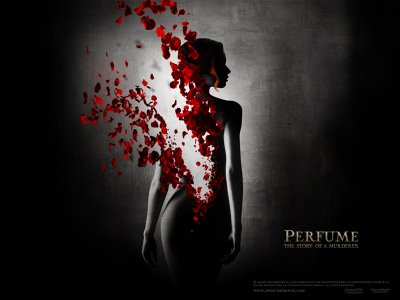
"Perfume: The Story Of A Murderer,” Patrick Süskind’s seductive novel about the power of scent, was first published in Germany and went on to sell 15 million copies around the world. For its many fans the evocative tale lingered like the bottom note of a fragrance. But it took 21 years to find its way onto screens.More from Coeli Carr in The New York Times.
Monday, November 27, 2006
Mark Ravenhill's Dick Whittington
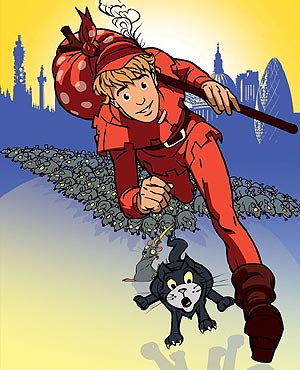
Playwright Mark Ravenhill wants to make one thing clear: "The posters for Dick Whittington say it's a family pantomime, and that's exactly what it is." Ever since it was announced that the 40-year-old author, whose 1996 debut Shopping and F***ing was full of explicit sex and violence, would be writing a Christmas panto, he's been plagued by innuendo."More from Aleks Sierz in The Telegraph.
"I've been harassed by all these media types," says Ravenhill, "saying nudge, nudge, wink, wink, I bet it's got anal sex in it. Well, actually, no it hasn't. It's a family pantomime.
Update: More from Ravenhill in The Guardian.
Another update: Still more in The Independent.
Children's BAFTAs
The winners of the BAFTA awards for Children's TV and film were announced last night. Notable winners included:
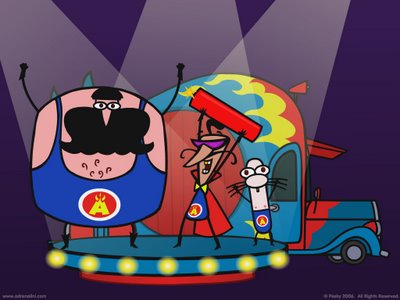 The Amazing Adrenalini Brothers: Directed by Dan Chambers and Claire Underwood, written by Mark Huckerby and Nick Ostler)
The Amazing Adrenalini Brothers: Directed by Dan Chambers and Claire Underwood, written by Mark Huckerby and Nick Ostler)
- Best Animation: The Amazing Adrenalini Brothers (written by Mark Huckerby, Nick Ostler)
- Best Pre-School Animation: Pocoyo (written by P. Kevin Strader and
Andy Yerkes) - Best Drama: The Giblet Boys (written by Nick Fisher)
- Best Feature Film: Wallace And Gromit: The Curse Of The Were-Rabbit (written by Nick Park, Bob Baker, Steve Box, Mark Burton)
- Best Writer: Peter Tabern (Johnny And The Bomb, based on the book by Terry Pratchett).
 The Amazing Adrenalini Brothers: Directed by Dan Chambers and Claire Underwood, written by Mark Huckerby and Nick Ostler)
The Amazing Adrenalini Brothers: Directed by Dan Chambers and Claire Underwood, written by Mark Huckerby and Nick Ostler)
Theatrevoice.com
Theatrevoice.com hosts an extensive archive of articles and broadcast interviews about theatre.
Thanks to Maxie Szalwinska in The Guardian for the link.
Thanks to Maxie Szalwinska in The Guardian for the link.
Nimer Rashed wins Ustinov award
British writer Nimer Rashed has won the 2006 Sir Peter Ustinov Television Scriptwriting award for his script The Great McGinty. The award, run by the organisation behind the Emmy's, is open to non-US citizens living outside the US who are under 30.
In addition to receiving a cheque for $2,500, Nimer's script will be performed by a group of professional New York actors at the International Emmy World Television Festival before an audience of worldwide television executives.
In the early 90s Nimer acted professionally on stage and screen. In 2006, his play Itchycoo Park won 2nd place at Soho Theatre’s Westminster Prize and was performed at the theatre. He has had further readings at the Soho Theatre, and is currently on the Young Writers Programme at the Royal Court. His fiction has appeared in Transmission and on Pulp Net.
In addition to receiving a cheque for $2,500, Nimer's script will be performed by a group of professional New York actors at the International Emmy World Television Festival before an audience of worldwide television executives.
In the early 90s Nimer acted professionally on stage and screen. In 2006, his play Itchycoo Park won 2nd place at Soho Theatre’s Westminster Prize and was performed at the theatre. He has had further readings at the Soho Theatre, and is currently on the Young Writers Programme at the Royal Court. His fiction has appeared in Transmission and on Pulp Net.
Friday, November 24, 2006
Unsolicited material welcome
If you're looking for somewhere to send a screenplay, writer and blogger Danny Stack has put together a list of companies who say they'll read it.
Betty Comden obituary
Betty Comden, who with her longtime collaborator Adolph Green wrote the lyrics and often the librettos for some of the most celebrated musicals of stage and screen, died yesterday in Manhattan. She was 89 and lived in Manhattan...More from Robert Berkvist in The New York Times.
During a professional partnership that lasted for more than 60 years, and which finally ended with Mr. Green’s death in 2002, the Comden-Green blend of sophisticated wit and musical know-how lit up stage shows like “On the Town,” “Wonderful Town,” “Peter Pan” and “Bells Are Ringing.” Their Hollywood credits included the screenplays for two landmark film musicals, “Singin’ in the Rain” and “The Band Wagon.”
Musicals and syphilis
Evening Standard critic Kieron Quirke sees encouraging signs for new playwrighting:
It seems serious plays are being outdone by musicals as never before in the West End...This is a great thing. The two golden periods of the commercial musical, which we might name separately after Rodgers and Hammerstein and Andrew Lloyd Webber, both preceded similarly gilt eras for British new writing, respectively the English Stage Company’s revolution of the 50s and the ‘in yer face’ revival of the 90s. You have to overdose on sugar before you get the insulin.
But my second submission is stronger still. Syphilis is back! Incidents are up nearly 3000% since the early 90s. History has taught us one thing: where syphilis goes, great literature follows, and theatre in particular sees a benefit.
Thursday, November 23, 2006
A screenwriters' roundatble
When a round table of screenwriters assembled at the swanky Viceroy hotel in Santa Monica back in May to look over the "Transformers" screenplay, it may not have had the solemn purpose of King Arthur's knightly conferences nor the savage wit of Dorothy Parker's vicious circle, but it did portend something significant.More from Jay A. Fernandez for the LA Times.
While bringing in a group of writers to brainstorm on a project is relatively common in television and feature comedies and animated films, especially early in the development process, big studio action movies like this one — born of the original mid-'80s television cartoon series — rarely get this kind of treatment.
Abi Morgan interview
In The Guardian, Gareth McLean talks to Abi Morgan about her new TV film, Tsunami: The Aftermath.
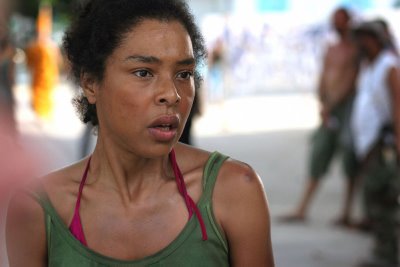 Sophie Okonedo in Tsunami: The Aftermath, written by Abi Morgan, directed by Bharat Nalluri. Photo by Kerry Brown for BBC/Kudos Film and Television
Sophie Okonedo in Tsunami: The Aftermath, written by Abi Morgan, directed by Bharat Nalluri. Photo by Kerry Brown for BBC/Kudos Film and Television
Morgan spent 10 days in Thailand researching the project, speaking to hundreds of people, in NGOs and the Thai government. Would she describe Tsunami: The Aftermath as a docudrama? "When I think of docudrama, I think of timelines flashing up on the screen and often more sketchily written characters. Part of the need and the desire to make Tsunami a fiction was that you can't do justice to an individual story. You can't fulfil what someone would want you to, so I told an amalgam of stories. But there's nothing in there that isn't based on fact, even the most shocking events."Tsunami: The Aftermath is on BBC2 on Tuesday November 28.
 Sophie Okonedo in Tsunami: The Aftermath, written by Abi Morgan, directed by Bharat Nalluri. Photo by Kerry Brown for BBC/Kudos Film and Television
Sophie Okonedo in Tsunami: The Aftermath, written by Abi Morgan, directed by Bharat Nalluri. Photo by Kerry Brown for BBC/Kudos Film and Television
Wednesday, November 22, 2006
RSC backs new writing
The Royal Shakespeare Company, keeper of the flame of the greatest playwright ever, plans to "knock Shakespeare off his podium", according to artistic director Michael Boyd, by increasing the proportion of new plays it stages to half of its total work.More from Charlotte Higgins in The Guardian.
"What is distinctive about the Royal Shakespeare Company is the relationship between the Renaissance and writing now," said Mr Boyd. "What excites me is the tension line between the 16th century and the present. New plays are more important than classical revivals."
The playwrights Marina Carr, Leo Butler and Roy Williams have all been recently commissioned by the RSC. But in a more far-reaching move, writers will be "embedded" within the company. The first of these, Adriano Shaplin, will be working with the actors who are preparing Shakespeare's history plays, all eight of which will be in the repertoire by spring 2008. The idea is for authors to write plays with a specific ensemble in mind, just as Shakespeare did. "It's a radical idea; but it is also our heritage," Mr Boyd said.
New Welsh theatre company
Wales’ new theatre company, created by the merger of Sherman Theatre with Sgript Cymru, has appointed former Arts Council of Wales chief executive Emyr Jenkins at its first chairman and Chris Ricketts as its inaugural director.More from Alistair Smith in The Stage.
The pair will lead the organisation, currently trading as the Contemporary Theatre and New Writing Company, when it becomes fully operational from April 1, 2007.
Tuesday, November 21, 2006
British shows win at International Emmy's
British drama and comedy had a good night at the International Emmy Awards in New York. British winners included:
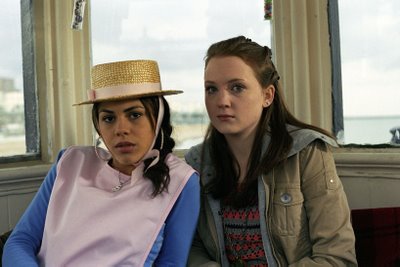 Lenora Crichlow and Olivia Hallinan in Sugar Rush, written by Katie Baxendale, based on the novel by Julie Burchill
Lenora Crichlow and Olivia Hallinan in Sugar Rush, written by Katie Baxendale, based on the novel by Julie Burchill
- Children And Young People: Sugar Rush, written by Katie Baxendale, based on the novel by Julie Burchill
- Comedy: Little Britain, written by Matt Lucas and David Walliams
- Documentary: Hiroshima, written and directed by Paul Wilmshurst
- Drama Series: Life On Mars, created by Matthew Graham, Ashley Pharoah and Tony Jordan.
 Lenora Crichlow and Olivia Hallinan in Sugar Rush, written by Katie Baxendale, based on the novel by Julie Burchill
Lenora Crichlow and Olivia Hallinan in Sugar Rush, written by Katie Baxendale, based on the novel by Julie Burchill
Nelson S Bond obituary
Although his name has since slipped from recognition, Nelson S Bond's byline on a magazine was a guarantee of a good story in the 1930s and 1940s. A prolific and often humorous writer, Bond, who has died at the age of 97, was at his best with the short story, once explaining: "One of my axioms of writing has always been that good stories are not written - they're rewritten. I would talk a story into the dictaphone, Betty [his wife] would type it, then I would revise it. The story had to be packed tight together. So I was fair at 10,000 words, good at 5,000 words, and excellent, sometimes, at 2,500. The shorter the Bond, the better the story."More from Steve Holland in The Guardian.
BBC Vision launched
Jana Bennet, the BBC's Director of Vision (really!) has launched BBC Vision, "the biggest integrated multimedia broadcast and production group of its kind in the world."
The press release states that BBC Vision is "so called because it makes BBC content that people watch".
It brings together several former BBC divisions: Drama, Entertainment and Children's; Factual and Learning; Television; and Network Production in the Nations.
This follows a restructure plan announced by BBC Director-General Mark Thompson earlier this year.
"Our creative purpose is to deliver great programmes and great content to all our audiences… The future will still be a place where audiences value great storytelling, elegant structure, high production values – all the traditional strengths of BBC programme makers. But at the same time we need to develop fresh ways of thinking and using technology. There are incredible opportunities in this new world if we can only organise ourselves to seize those opportunities and make them work for our audiences."
The press release states that BBC Vision is "so called because it makes BBC content that people watch".
It brings together several former BBC divisions: Drama, Entertainment and Children's; Factual and Learning; Television; and Network Production in the Nations.
This follows a restructure plan announced by BBC Director-General Mark Thompson earlier this year.
Bradwell leaves The Bush
Mike Bradwell has announced that he will step down as artistic director of The Bush Theatre next year, after more than ten years in the job...The Bush’s board will shortly be advertising for a replacement artistic director to lead the theatre’s planned move into a larger building.More from Nuala Calvi in The Stage.
Monday, November 20, 2006
Tony Jordan's ITV double
EastEnders uber-writer Tony Jordan has won a double commission from ITV, reports Jason Deans for Media Guardian (free registration required).
Moving Wallpaper, for ITV1, is a single-camera comedy drama set behind the scenes at a new soap, Echo Beach, which will be broadcast on the same night on ITV2. Echo Beach will be set in a Cornish resort.
Taking a cue from the scheduling of big reality TV event shows such as I'm a Celebrity, Get Me Out of Here!, Moving Wallpaper and Echo Beach will be broadcast in tandem each night for two weeks, either late next year or in early 2008.
The idea, which is still in the early planning stages, is for ITV1 viewers to watch the behind-the-scenes shenanigans of Moving Wallpaper on ITV1, then switch over to ITV2 for the front-of-camera scenes in Echo Beach.
Bond writers
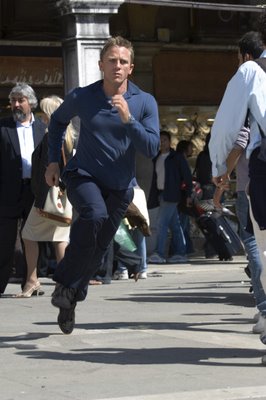 Robert Wade and Neal Purvis who, along with Paul Haggis, wrote the new Bond film, Casino Royale, talk to Vincent Dowd for BBC News.
Robert Wade and Neal Purvis who, along with Paul Haggis, wrote the new Bond film, Casino Royale, talk to Vincent Dowd for BBC News. Surely one of the problems with Bond has always been he remains essentially the same throughout the movie? That can get dull.Photo: Daniel Craig in Casino Royale, screenplay by Robert Wade and Neil Purvis & Paul Haggis, from the novel by Ian Fleming, directed by Martin Campbell.
Purvis - But Casino Royale gives you the opportunity for a proper arc to his character. He changes from the beginning to the end. He's very young, raw, out of control almost.
Wade - What you have with the Bond movies is this character gliding over everything. The fact nothing touches him is why we all want to be him. But it also makes him a sort of superman who in the end you don't really relate to.
This time you'll see someone who gets completely broken down and has to rebuild himself. He forges the steel of his character through the emotional turmoil he goes through. So we end up with a character who has a kind of moral compass - and I think from here on you'll feel Bond is denying his own emotions.
London To Brighton
Hang out with would-be filmmakers in Britain for any period of time and you'll hear a familiar litany of woes – all under the heading about how awfully difficult it is to get a film made.More from David Gritten in The Telegraph.
Funding bodies, you'll hear, are conservative and over-cautious, ruinous changes to scripts are routinely demanded, and money is grindingly slow to come through. Some filmmakers become so demoralised, they simply give up.
Yet a startling new British film, London to Brighton, stands as a beacon of hope. It was shot on a shoestring £80,000, raised from private investors, by a young production team. Its script, by first-time writer-director Paul Andrew Williams, remained essentially unchanged. It opens in Britain in two weeks' time.
"We shot it under the radar, so to speak," says producer Rachel Robey, 30. "That was the plan – to make it quickly and quietly, with confidence in the script and the director."
 Lorraine Stanley (left) and Georgia Groome in London To Brighton, written and directed by Paul Andrew Williams.
Lorraine Stanley (left) and Georgia Groome in London To Brighton, written and directed by Paul Andrew Williams.
Independent book shops
For a self-published author, writes Iqbal Ahmed in The Independent, independent book shops can be your only route to an audience.
I discovered an unspoken fraternity among the independent booksellers of London. When I went to deliver copies of my book to Newham Bookshop one afternoon, Vivian Archer picked up the phone and called Eastside Books for me. They were happy to stock my book on Vivian's recommendation. Similarly, Mary in Prospero's Books introduced me to Muswell Hill Bookshop. It took me just ten months to sell out the first edition of my book.
Friday, November 17, 2006
Ofcom bans junk food ads on kids TV
The communications industry regulator, Ofcom, has decided that advertising for junk food should be banned on kids TV. While health campaigners will be pleased, it's another blow for the beleaguered commercial children's TV sector, especially ITV.
There's comment and analysis from Mark Sweney for Media Guardian.
There's comment and analysis from Mark Sweney for Media Guardian.
Anne Cofell Saunders interview
In Creative Screenwriting, Jeffrey A. Dobberpuhl talks to Anne Cofell Saunders about writing for Battlestar Galactica and 24. 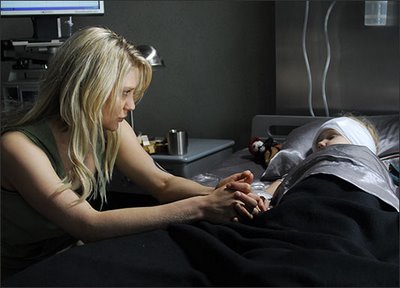 Battlestar Galactica, Season Three. Shown in the UK on Sky One.
Battlestar Galactica, Season Three. Shown in the UK on Sky One.
The pace is the most difficult part of the job. It's not just trying to be creative and excellent, but it's trying to do it on cue. That's the hardest part. "Be brilliant now!" Someone points their finger at you and you have to perform in that moment. Whether you are turning in a script on time or you are in the room and Ron Moore is pacing the room and he turns to you and says, "What do you think?" you want to be brilliant. These are the hardest moments, to perform on cue to a high standard of excellence.
 Battlestar Galactica, Season Three. Shown in the UK on Sky One.
Battlestar Galactica, Season Three. Shown in the UK on Sky One.
ITV looking for new daytime soap
Despite the abject failure of Crossroads mark two and the ill-fated Night and Day, ITV is again planning a move back into daytime soap and has compiled a shortlist of ideas for a new long-running series.More from Leigh Holmwood for Media Guardian (free registration required).
It is understood that the commercial broadcaster has shortlisted four or five production companies following a tender document it sent out during the summer for a new show aimed at a slightly older female audience.
The revived Crossroads really was awful. Night And Day at least tried something different but it never really found its feet. The models to follow for daytime soaps, in my opinion, are Neighbours and Home And Away. They're often ridiculed but in fact they're tightly plotted, well acted and well written. Plus, they get excellent ratings.
Named and shamed
If a character you create has the same name as a real person you could be in trouble, says John Sutherland in The Guardian. Take Jake Arnott's latest novel,Johnny Come Home:
In his narrative, set in London's tin pan alley in the 70s, Arnott introduced a character called Tony Rocco: a one-time big-band singer, now an impresario and a big-time pervert in the Harry Starks mould. Nasty. Alas, out of obscurity, escorted by his learned friends in wigs, emerges the real-life Tony Rocco: former big-band singer and a figure of unimpeachable respectability.
Exit the book. Exit, also, many thousands of pounds from the coffers of Arnott's publishers, Hodder and Stoughton.
Thursday, November 16, 2006
David Ayer interview
Dylan Callaghan interviews screenwriter David Ayer for the Writers Guild of America, west. 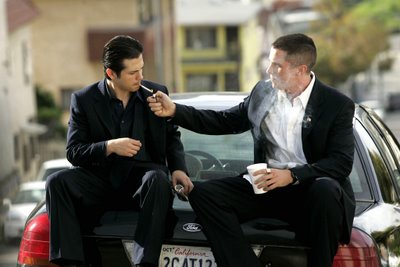 Freddy Rodriguez and Christian Bale in Harsh Times, written and directed by David Ayer.
Freddy Rodriguez and Christian Bale in Harsh Times, written and directed by David Ayer.
David Ayer's story is that oft-adduced, rarely seen example of a unique voice -- a genuine outsider -- finding success in the Hollywood trade. The Training Day screenwriter takes his first turn helming with the new film, Harsh Times, which stars Christian Bale as a Persian Gulf War vet, returning home to South-Central L.A. and its seductive thug life. For Ayer, it is a case study in writing what you know. Instead of going from parents with money and influence to some tony film school, he's a high school dropout, who at 14 was kicked out of home for bad behavior and moved in with a cousin in South-Central. After surviving those mean streets for several years, Ayer eventually wised up enough to escape death or imprisonment via a three-year stint in the U.S. Navy.
 Freddy Rodriguez and Christian Bale in Harsh Times, written and directed by David Ayer.
Freddy Rodriguez and Christian Bale in Harsh Times, written and directed by David Ayer. "I think we've ridden the whole Joseph Campbell monomyth to death. The moral universe all Hollywood movies have to take place in is familiar ground to moviegoers. So writers have to do things like chopping up the narrative or telling stories backwards to get ahead of the audience.
There's a moral map that everyone has to use -- the studios push the moral universe in a certain direction that's very action-consequence, you know? You do something bad; something bad's going to happen to you in the next scene. I think real life is definitely more complex than that. In real life, good people get punished and bad guys don't. That's common. In my scripts I like to have a little moral complexity there."
Burger King to drop children's TV ads
Fast food giant Burger King is axing TV advertising aimed at children amid mounting concerns about a British obesity crisis.More from The Daily Mail.
The move comes as the TV watchdog, Ofcom, is about to announce its own plans to restrict the TV advertising of junk food.
Comment: While most people are sympathetic to the need to protect children from inappropriate advertising, there is concern among writers that loss of revenue could further weaken commercial TV production for children.
Channel Four to offer 99p downloads
Channel 4 is to offer a "catch-up" service for viewers by offering much of its programming online for 30 days after transmission for 99p per episode.More from BBC News.
Current series such as Hollyoaks and Ramsay's Kitchen Nightmares will be available, alongside archived output from the network's 24 years on air.
The agreement covers all "homegrown" shows commissioned since June.
Each programme will "disappear" from users' computers 48 hours after they start to watch it.
It will be kept in a personalised library until it is first viewed, and then can be accessed an unlimited number of times during that two-day period.
Tuesday, November 14, 2006
jaWiki
Screenwriter and blogger, John August, has launched a screenwriting wiki (jaWiki). Wikis are collaborative editing tools, most famously used by the fantastically useful Wikipedia.
If you register on John August's site you can edit or create entries, helping to create an online encyclopedia of screenwriting. Certain entries might get controversial, however. What, for example, would you say about screenwriting 'guru' Robert McKee?
If you register on John August's site you can edit or create entries, helping to create an online encyclopedia of screenwriting. Certain entries might get controversial, however. What, for example, would you say about screenwriting 'guru' Robert McKee?
Science Fiction Britannia

A treat for fans of British sci-fi, BBC Four are running a special season of programmes under the heading Science Fiction Britannia (it started yesterday, in fact).
In The Times, Ian Johns previews some of the treats in store. These include my own personal favourite, Blake's 7.
Like Star Trek, this had an interplanetary band championing democracy and freedom but in a far less shiny future. Blake, framed on a child molestation charge (!) by a fascist oligarchy, went on the run with a small group of disillusioned outlaws. Democracy and freedom were comprehensively trounced when our heroes died in a welter of mistrust and bullets.
Is such pessimism a peculiarly British trait? It certainly produced the two most enduring dystopian visions, both informed by class anxieties: George Orwell’s Nineteen Eighty-Four with spy gadgets in every television and Stalinist/Nazi oppression; and Aldous Huxley’s Brave New World with its bred-to-order society controlled by sex and drugs.
Kings Cross New Writing Award 2007 - updated
An update to the information in our earlier post, from Melanie Branton:
Ooops! Just a few corrections since I first sent out publicity on this several months ago. The Courtyard has now moved to 55 East Road, London N1 6AH, and entries should be sent there, not to the York way address. Also, the prize this year is £2500 in cash and a staged rehearsed reading to an invited audience of theatre professionals (literary agents, directors, producers and the like). E-mail me for further details. Also, our website, www.thecourtyard.org.uk should contain more information shortly.
Monday, November 13, 2006
Women TV writers in America
In The New York Times, talks to some of American TV drama's leading women writers.
When Ms. [Melinda] Hsu worked on “Medium,” she had a “bring-your-own-nanny” day care space in the next building that the show’s lead actress, Patricia Arquette, had designed for her own toddler. “It was fully stocked with every kind of educational toy you can imagine,” said Ms. Hsu, who returned to work when Penny was 5 weeks old and found that the setup allowed her to nurse. But because workplace culture varies, some women had to choose jobs carefully. Ms. Newton, 41, a single mother, froze her embryos when she was 36 and waited for the right show to get pregnant. She found it with “Las Vegas,” where she takes Oscar to the Sony lot every Tuesday. “It’s such a male show,” she said, “but the guys are great.” Photos of Oscar adorn a hallway bulletin board and his toys fill a large basket in her office.
Stephen King interview
In The Telegraph, Nigel Farndale talks to novelist Stephen King.
He tells me wearily that he is bound to be described as a 'horror writer' in the first line of his obituary. He wants to be taken more seriously, is that it?
'That doesn't bother me,' he says, 'it's never that I've felt that much need for respect. My family has been eating. My house is paid for. And, in the end, after you're gone, the work finds its own level.
"The critics don't have much say in that. Some of the books which everyone sneered at for being disposable, such as Agatha Christie, have actually survived the longest on the bookshelves. No, what drives me crazy is when I am treated as a sociological artefact. No one wants to be reduced to a human beetlewig or a hallowe'en mask.'
David Hare on Broadway
As David Hare's new play, The Vertical Hour, is prepared to open on Broadway, Gaby Wood on The Observer went behind the scenes.
Hare wrote The Vertical Hour - which has at its centre a character named Nadia Blye, former war correspondent, now star professor of political studies at Yale - because he was interested in the liberal pro-Iraq war position. 'All those academics,' as he puts it, 'who were in favour of the war for sound idealistic reasons.' He sees it as a companion piece to his last play, Stuff Happens, which dramatised the events leading up to the Iraq war with real politicians as its core characters. 'Whereas one's the public story of what actually happened,' he explains, 'this one - for me - is about: in what way are our lives different than five years ago, and in what perspective do we need now to see our lives? Western life is like a painting: our colour has been changed by another colour being painted at the top - we're looking at ourselves very differently from the perspective of what our so-called enemies believe about us. It's led to a rich period of self-examination.'
Friday, November 10, 2006
Suzan-Lori Parks's 365 play cycle
There are your everyday whims, and then there are the whims of a Pulitzer Prize-winning writer. The writer in this case is Suzan-Lori Parks, who decided one afternoon in 2002 that she would write a play a day for a year. Ha! Neat idea.More from Campbell Robertson in The New York Times.
Well, four years later those plays are about to be presented in what may be the largest and most elaborate theatrical premiere ever, involving some of the most prominent institutional theaters in the country as well as summer-stock theaters in Montana, community ensembles on the South Side of Chicago, a nursing home in Atlanta and an abandoned movie house in the valley of the Rio Grande.
Erin Cressida Wilson interview
In The Hollywood Reporter, Martin A. Grove talks to screenwriter Erin Cressida Wilson about her new film Fur: An Imaginary Portrait of Diane Arbus (from a book by Patricia Bosworth).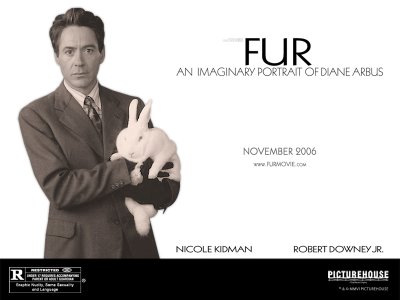
What Wilson had in mind was "to not go by the normal rules of a biopic, which can often (mean) going through all of the episodes of a person's life, but to look more at the background and the details and the themes of Diane Arbus's life and to create a film that might attempt to show the moments where her creativity ignited into her becoming an artist in her mid-30s. I still notice in biopics the problem that happens in the connective tissue between events. It always seems to be this shuffling to get to the next event because, in fact, the writer doesn't know what happened in-between. And none of us knows what happens in-between to these people. So I didn't want to pretend that I knew what happened in-between or to try to re-enact the moments of her life that we all know, but to try to create something that we could feel. I wanted to walk out of this picture feeling what it was like to become this artist rather than to know some high points of her life."

Charles Frazier interview
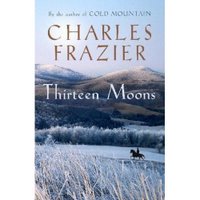 In The Independent, John Freeman talks to American novelist Charles Frazier.
In The Independent, John Freeman talks to American novelist Charles Frazier. There are many things that Charles Frazier would like to preserve in his home state of North Carolina, but right now two loom large in his mind: independent bookstores and the Cherokee language. The chances are that Thirteen Moons, his much-anticipated new novel, could make a difference with both. Sitting in Quail Ridge Books in Raleigh, North Carolina, Frazier has begun to set this plan in motion. Rather than hit the road and barnstorm the big US cities and morning talk shows, he has chosen to unveil Thirteen Moons - perhaps the most hotly desired novel in America in the last decade - at this tiny independent store.
Thursday, November 09, 2006
Kings Cross New Writing Award 2007
The Courtyard Theatre in London is seeking entries for its biennial Kings Cross New Writing Award.
The cost of entry is £5 per play. The winning play will receive a professional staging at The Courtyard.
The cost of entry is £5 per play. The winning play will receive a professional staging at The Courtyard.
QuickMuse
Watch poems being written in real time at QuickMuse. Weirdly compelling. Thanks to The Telegraph's Ceri Radford for the link.
There's an article by Ken Gordon, the man behind QuickMuse, in Poets and Writers.
What's QuickMuse?
QuickMuse is a cutting contest, a linguistic jam session, a series of on-the-fly compositions in which some great poets riff away on a randomly picked subject. It's an experiment, QuickMuse, to see if first thoughts are indeed the best ones. We're not entirely sure about this, but we suspect QuickMuse will bring readers closer to the moment of composition than they have ever been before. Best part: our "playback" feature lets you watch the poems unfold, second by second. Or as Thlyias Moss says, it's "the chance for a poem to find its/audience fast," in which words don't "have as much/time to stale, pale/lose the relevance of the moment" to which they belong.
SteveThompson interview
Playwright Steve Thompson talks to Brian Logan in The Times, ahead of the opening of his new play Whipping It Up.
Thompson is...a novice playwright — at 39, he has written professionally only since 2004. He was a schoolteacher for ten years, before quitting to play house-husband and childcarer while his barrister partner worked. That’s when he started writing.
His first play, Damages, about a night lawyer in a scurrilous tabloid newspaper office (the play was based on his wife’s experiences), had a sell-out run at the Bush two years ago.
Whipping It Up is the second in a trilogy of what Thompson describes as his “work plays” — plays set in work environments rather than (as theatre tends to prefer) living rooms, bedrooms or pubs. “I love the rhythm of the workplace,” says Thompson. “Nobody can sit still and do an aria and talk about their life and loves. Real life seeps out quietly while you’re busy doing your job.”
(Thompson’s next instalment, currently under commission, is to be set in the City of London.) Is his interest in “work plays” related to the fact that, unlike most writers, he spent years working nine-to-five in a proper job? “If I had tried to write a play when I was 21,” he agrees, “I wouldn’t have had anything to write about.”
Wednesday, November 08, 2006
Jules Dassin
America blacklisted the man. Italy exiled him. France embraced him. Greece considers him a national hero. The man is legendary writer-director Jules Dassin who, despite hostile treatment from his own government, still claims, “I am American, and that I will stay.” This coming from a writer forced to flee the United States in 1950 and who has lived in Greece since the early 1960s.More from Sandra Berg for the Writers Guild of America, west.
The name Jules Dassin might not be immediately recognizable to most people, but his classic films are known throughout the world-Rififi, Topkapi, Never on Sunday, Naked City, Thieves' Highway.
Tuesday, November 07, 2006
The future of film finance
Screenwriter and blogger Craig Mazin on a new dawn in movie financing and production.
In the future, a filmmaking unit will not work as employees for a studio. Rather, the filmmaking unit (writer and director and perhaps star) will present their vision of a movie to a group of independent financiers, who will form a partnership with the filmmakers. Obviously, this is nothing new. Hell, just about every indy art film is made this way. What’s changing is the amount available.
Carnival boosts drama production
Hotel Babylon producer Carnival Films will boost its drama output to a record 22 hours next year after BBC1 commissioned a two-part Sea of Souls special and ITV ordered an adaptation of Charles Dickens' Old Curiosity Shop.More from Leigh Holmwood in Media Guardian.
BBC1 has commissioned three new supernatural dramas from Carnival, which will also produce a second eight-part series of glamour drama Hotel Babylon.
Any announcement of new drama commissions is good news, but this story particularly caught my eye because the writer of one the supernatural dramas is Stephen Gallagher - Guild member and friend of this blog. Nice one, Stephen.
Art is useless
In The Observer, Paul Auster argues that art is 'useless' - in a good way.
Some like to think that a keen appreciation of art can actually make us better people - more just, more moral, more sensitive, more understanding. Perhaps that is true - in certain rare, isolated cases. But let us not forget that Hitler started out in life as an artist. Tyrants and dictators read novels. Killers in prison read novels. And who is to say they don't derive the same enjoyment from books as everyone else?
In other words, art is useless, at least when compared, say, to the work of a plumber, or a doctor, or a railroad engineer. But is uselessness a bad thing? Does a lack of practical purpose mean thatbooks and paintings and string quartets are simply a waste of our time? Many people think so. But I would argue that it is the very uselessness of art that gives it its value and that the making of art is what distinguishes us from all other creatures who inhabit this planet, that it is, essentially, what defines us as human beings.
Monday, November 06, 2006
Ryan Murphy interview
Dylan Callaghan talks to writer-director Ryan Murphy for the Writers Guild of America, west. 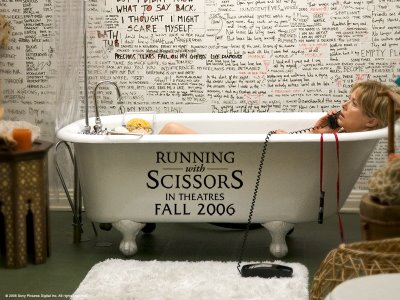 Annette Bening in Running With Scissors, written and directed by Ryan Murphy from the book by Augusten Burroughs.
Annette Bening in Running With Scissors, written and directed by Ryan Murphy from the book by Augusten Burroughs.
It follows that writer-director Ryan Murphy's debut feature, Running With Scissors is founded in actual events. After all, the Nip/Tuck creator spent years as a journalist, writing for dozens of publications from the Los Angeles Times and The Miami Herald, to Entertainment Weekly. Rather than make up the story for his first film, he based it on the tragic-comic 2001 memoir by then-first-time author, Augusten Burroughs. The book is the eminently singular chronicle of an off-kilter childhood that included being dropped off by his mother to live with her psychiatrist's family.
 Annette Bening in Running With Scissors, written and directed by Ryan Murphy from the book by Augusten Burroughs.
Annette Bening in Running With Scissors, written and directed by Ryan Murphy from the book by Augusten Burroughs.
How disciplined of a writer are you?
Very. Because I used to be a journalist, I was never allowed the benefit of writer's block. I'd have to write three stories a day, so that's never been a problem. You know, I think I had done 30 drafts of Running With Scissors before Annette read it. I work with a writer's group, and we meet once a week, and I'd go and they'd say, “Do it again.” It went on forever. It was complicated, and it took me a while to get it right. Some of the Nip/Tuck episodes just came out letter-perfect, so it just depends. This piece was a struggle because I had to be responsible to someone's life, and I was very particular with it. Plus it's such a weird story.
Literary partnerships
When writers live together, by Lesley McDowell in The Independent.
Leonard Woolf recorded his regret about the influence Middleton Murry had on Katherine Mansfield's writing: "She got enmeshed in the sticky sentimentality of Murry and wrote against the grain of her own nature", and for most of the 10 years she spent with Wells, West got very little writing completed. Yet in general, their literary partnerships seem to have served these women writers well. Middlebrook notes that the intrusion of [Ted] Hughes's language in [Sylvia] Plath's writing improved her poetry, and [Martha] Gellhorn's letters to [Ernest] Hemingway show a more masculine, hardy tone, one that seems to have stood her in good stead for war reporting.
BBC Children's TV to be revamped
The BBC is to revamp its digital channels CBeebies and CBBC, with "fewer but higher quality" programmes.
"CBBC is due for refreshing, we were losing four to five-year-olds, especially boys," said CBeebies creative director Michael Carrington.
He said there would be "fewer, bigger and better" programmes and boys had already started returning with shows like Lunar Jim and Underground Ernie.
CBeebies, aimed at pre-schoolers, will now target those up to the age of six.
More from BBC News.
Friday, November 03, 2006
Jeremy Brock interview
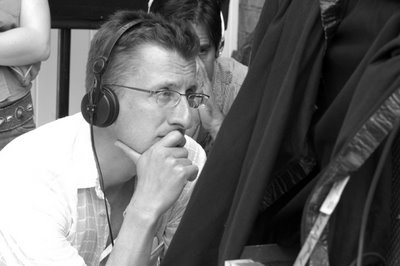
Jeremy Brock, who was one of the creators of BBC TV's Casualty, is now a seasoned feature film writer. Driving Lessons, his first film as a writer-director, was released in the UK a couple of weeks back. In Creative Screenwriting he talks to Danny Munson.
A lot of your past writing leaned toward the dramatic side of film, so why the sudden shift to comedy?
I think probably these are the kinds of films that I go to the movie theaters to see, but I'm always looking for ways to inject something ironic, because I enjoy that take on people. Our lives aren't strictly dramatic or strictly comical. We don't live by genre; we live by haphazard chance, so our lives are full of some strange mixture of bathos and pathos. The movie I suppose I was trying to do here has bathos and pathos right up against each other, and some people find that disconcerting and irritating. But for my tastes, I like that. I like having someone being sick and then be funny the next scene. I have no problem with that.
Audiobooks
Audiobooks - sold on CD as MP3s - are a growing part of the publishing trade. John Morrison's extensive survey of the audiobook market, and what it means for writers, first published in the Writers' Guild of Great Britain's magazine, UK Writer, is now online.
For the BBC, the biggest download hits so far have been the mainstream works of PD James and Bill Bryson. Philip Nixon of Spoken Network says that in his view over-45s are the key market. “This is why publishers are excited,” he says. “There are new sub-groups coming into the marketplace who are not traditional audiobook buyers, but now have broadband.”
So it’s not the impecunious Napster generation but the time-poor, cash-rich generation between 30 and 50 who are going to be the new customers. “Listening is fundamentally a background experience,” says Jonathan Korzen of Audible. “Your eyes are busy but your mind is free, so you can listen while you’re out walking or weeding the garden.”
Liberating spelling
If you're someone who gets vexed by bad spelling, Simon Jenkins in The Guardian has a simple message for you: don't.
It is plain silly to regard doughnut as "better" than donut. The same goes for alternatives to night, through, colour and wholesome. When the great Noah Webster invented American spelling after independence, he left British English immured in bigotry. He chided "even well-bred people and scholars for surrendering their right of private judgment to literary governors". To Americans, spelling reform was the sovereignty of common sense. For that reason the British treated it as foreign, vulgar and, worst of all, American.
I have no quarrel with grammatical authoritarianism. Grammar is a vehicle that needs a highway code of human communication. To parse is to prosper. Grammar evolves to reflect the new uses that language requires of it, as dictionaries include new words. Adverbs and adjectives fight the good fight against poverty-stricken nouns and verbs. Prepositions and conjunctions are hurled into the fray. A controversial time is had by all.
In contrast, spelling has become a no-go area, an intellectual tundra. While plain writing is considered a stylistic virtue, plain spelling is a vice. English orthography is an edifice of unreason. Word endings are the last gasp of the Anglo-Saxon and Norman invasions, embedded in the cultural DNA of literary Brahmins. Not to spell properly is a sign of being common, as once was ignorance of Latin. Knowing your "ie" from "ei" or -ible from -able does not affect a word's meaning one jot. It is a caste mark, its distinction deriving from its very obscurity.
Thursday, November 02, 2006
New London Writers' Collective
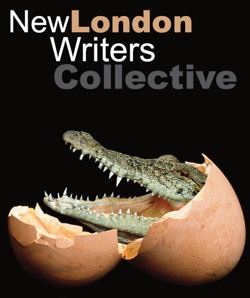 One of the biggest problems with producing plays on the fringe is the cost of hiring a venue. Most insist on a run of at least three weeks and rental is normally at least £150 per night. That's a big outlay and, unless you have a very large family or get rave reviews, you're likely to make a significant loss.
One of the biggest problems with producing plays on the fringe is the cost of hiring a venue. Most insist on a run of at least three weeks and rental is normally at least £150 per night. That's a big outlay and, unless you have a very large family or get rave reviews, you're likely to make a significant loss.Writer and producer Kieron Barry has addressed the problem by creating the New London Writers' Collective, which brings together four new plays for a run at The Tabard Theatre in London, starting next week.
With plays staged in double bills on alternate nights, costs are shared and each production has a more manageable run of nine performances. Kieron has also conceived the season as being writer-led - a hook from which to hang the much-needed publicity.
A declaration of interest: I'm one of the writers. My play, Antigua, opens at The Tabard on Tuesday 7th November at 9pm.
For anyone new to writing for theatre I've also written a piece for Danny Stack's blog about getting started as a playwright.
Theatre against censorship
Playwright David Edgar, National Theatre artistic director Nicholas Hytner and Behzti director Janet Steel are to unite against the threat to freedom of artistic expression posed by fundamentalist religious groups and the attempted censorship of plays such as Jerry Springer - the Opera.More from Alistair Smith in The Stage.
A one-day conference, organised by Equity and sponsored by The Stage, is to be held at the National Theatre later this month, with a number of high-profile panellists also including director Michael Bogdanov, writer John Mortimer and freedom of expression campaigner Lisa Appignanesi, which will attempt to confront what organisers warn is a growing danger to theatre in the UK.
Nigel Kneale 1922-2006
Nigel Kneale, one of the great pioneering TV drama writers, has died at the age of 84. Although he disliked being known as a science fiction writer, Kneale's Quatermass Experiment in 1953 was the UK's first sci-fi serial. Other work included The Year Of he Sex Olympics (1968, The Stone Tape (1972) and, more recently, episodes of Sharpe and Kavanagh QC.
BBC News has a summary of his career, and tributes from readers.
There are obituaries in The Guardian, The Times, and The Independent.
The Guardian also has an appreciation of Kneale by writer and actor Mark Gatiss.
BBC News has a summary of his career, and tributes from readers.
There are obituaries in The Guardian, The Times, and The Independent.
The Guardian also has an appreciation of Kneale by writer and actor Mark Gatiss.
Born in Lancashire but raised on the Isle of Man, he brought a strange, outsider's perspective to his work. Originally an actor, Kneale began writing short stories, including Jeremy in the Wind and The Photograph.
The acclaim Kneale received brought him to the attention of pioneering BBC producer Rudolph Cartier, and Kneale became a staff writer. The two men struck up an immediate rapport and collaborated on The Quatermass Experiment in 1953. Kneale wrote that it was "an over-confident year" and he piloted his hugely influential tale like a rocket into the drab schedules of Austerity Britain.
Over the decade, Kneale and Cartier produced two more Quatermass serials that emptied pubs, were spoofed by the Goons and Hancock, and cemented themselves in the psyche of a generation. What sci-fi piece of the past 50 years doesn't owe Kneale a huge debt? The "man into monster" theme of Experiment and the paranoid conspiracy of Quatermass II and, particularly, the "ancient invasion" of Quatermass and the Pit cast a huge shadow. The latter - with its brilliant blending of superstition, witchcraft and ghosts into the story of a five-million-year-old Martian invasion - is copper-bottomed genius.
A true pioneer has passed - and the light of Mars will shine a little brighter tonight.
Wednesday, November 01, 2006
William Broyles Jr. interview
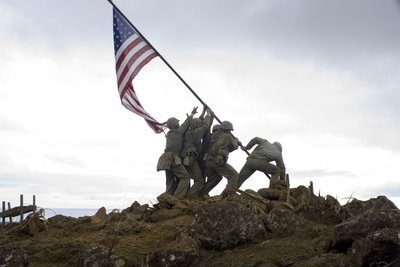 Flags Of Our Fathers, written by William Broyles Jr. and Paul Haggis from the book by James Bradley.
Flags Of Our Fathers, written by William Broyles Jr. and Paul Haggis from the book by James Bradley.Dylan Callaghan talks to William Broyles Jr. for the Writers Guild of America, west.
Since serving in Vietnam as a Marine Lieutenant, William Broyles, Jr. has gone on to successful careers as a both a journalist and a Hollywood screenwriter, but he's still very much the war veteran that led a platoon of men in combat. Though he's scribed for films as disparate as Polar Express and Planet of the Apes, nothing is more personal to him than the war movies he's worked on, including last year's Jarhead and the new Clint Eastwood-helmed Flags of Our Fathers.
Broyles put his heart and the better part of two years into adapting James Bradley's same-titled novel, hoping Steven Spielberg would direct the film, but as is so often the case in Hollywood, things didn't quite go as planned. Instead, Oscar-winning writer-director Paul Haggis penned a second incarnation of Broyles' script and was able to persuade Clint Eastwood to shoot it. In a trade where being rewritten is anathema, Broyles is not only a dutiful warrior without a hint of bitterness, but says flatly that Haggis did a better job and that, in the final assessment, he is grateful the film he was so passionate about was finally made.
Jane Tranter interview
BBC Writersroom has a new video interview with Jane Tranter, Controller of Fiction Commissioning.
She's responsible for drama commissioning across BBC television.
She's responsible for drama commissioning across BBC television.
International Radio Playwriting Competition
BBC World Service and the British Council have teamed up to find the next Pinter, Brecht or Soyinka with the launch of their tenth annual International Radio Playwriting Competition.
Writers who are new to radio are invited to submit an original 60-minute radio play on a subject of their choice. The competition, which has no age limit, is open to those living outside the UK and closes on Monday 30 April 2007.
More from the BBC.
Writers who are new to radio are invited to submit an original 60-minute radio play on a subject of their choice. The competition, which has no age limit, is open to those living outside the UK and closes on Monday 30 April 2007.
More from the BBC.
Subscribe to:
Comments (Atom)


